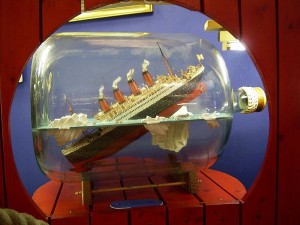On writing: chocolate smoothies and ships in a bottle
Sunday, February 16th, 2014A weekend that was supposed to be dedicated to writing, but largely spent this way: bathed the elderly dog; washed, boiled and sterilized dog beds; cleared mountain of books, papers, office equipment from my desk a.k.a. bed (California King); then washed, boiled and sterilized my bed; persuaded daughter to change light bulb in ceiling I couldn’t reach myself; did several loads of laundry; pruned roses (a little); pruned olive trees (well… persuaded a friend to prune olive trees, I did the cheerleading); washed a giant rug in the bathtub; dinner with the friend who did the pruning. Then, writing.
 All the tasks were necessary … in fact, long overdue. But I do wonder why it takes so long to get to writing. Fortunately, Megan McArdle over at The Atlantic explains it all. She describes the drearily familiar habit of a writer’s procrastination: “In the course of writing this one article, I have checked my e-mail approximately 3,000 times, made and discarded multiple grocery lists, conducted a lengthy Twitter battle over whether the gold standard is actually the worst economic policy ever proposed, written Facebook messages to schoolmates I haven’t seen in at least a decade, invented a delicious new recipe for chocolate berry protein smoothies, and googled my own name several times to make sure that I have at least once written something that someone would actually want to read.”
All the tasks were necessary … in fact, long overdue. But I do wonder why it takes so long to get to writing. Fortunately, Megan McArdle over at The Atlantic explains it all. She describes the drearily familiar habit of a writer’s procrastination: “In the course of writing this one article, I have checked my e-mail approximately 3,000 times, made and discarded multiple grocery lists, conducted a lengthy Twitter battle over whether the gold standard is actually the worst economic policy ever proposed, written Facebook messages to schoolmates I haven’t seen in at least a decade, invented a delicious new recipe for chocolate berry protein smoothies, and googled my own name several times to make sure that I have at least once written something that someone would actually want to read.”
My personal favorite is “googled my own name several times to make sure that I have at least once written something that someone would actually want to read.” I actually do that often. It kind of helps.
Why are we so easily distracted? According to McCardle, “As long as you have not written that article, that speech, that novel, it could still be good. Before you take to the keys, you are Proust and Oscar Wilde and George Orwell all rolled up into one delicious package. By the time you’re finished, you’re more like one of those 1940’s pulp hacks who strung hundred-page paragraphs together with semicolons because it was too much effort to figure out where the sentence should end.”
Hmmmm… read the rest here. But be warned, the piece on “Why Writers are the Worst Procrastinators” takes a weird twist in the middle, and turns into another article entirely. Bad case of cut-and-paste to meet a deadline crunch?
On a more positive note: Carl Zimmer is a science columnist for the New York Times and the author your Evolution: The Triumph of an Idea. Over here, he has some useful tips on writing. Here’s what he said when he was asked: What’s the one thing you’ve learned over time that you wish you knew when you started out?
“I wish someone told me I shouldn’t be making ships in a bottle.
“To write about anything well, you have to do a lot of research. Even just trying to work out the chronology of a few years of one person’s life can take hours of interviews. If you’re writing about a scientific debate, you may have to trace it back 100 years through papers and books. To understand how someone sequenced 400,000 year old DNA, you may need to become excruciatingly well acquainted with the latest DNA sequencing technology.
“Once you’ve done all that, you will feel a sense of victory. You get it. You see how all the pieces fit together. And you can’t wait to make your readers also see that entire network of knowledge as clearly as you do right now.
“That’s a recipe for disaster. When I was starting out, I’d try to convey everything I knew about a subject in a story, and I ended up spending days or weeks in painful contortions. There isn’t enough room in an article to present a full story. Even a book is not space enough. It’s like trying to build a ship in a bottle. You end up spending all your time squeezing down all the things you’ve learned into miniaturized story bits. And the result will be unreadable.
“It took me a long time to learn that all that research is indeed necessary, but only to enable you to figure out the story you want to tell. That story will be a shadow of reality—a low-dimensional representation of it. But it will make sense in the format of a story. It’s hard to take this step, largely because you look at the heap of information you’ve gathered and absorbed, and you can’t bear to abandon any of it. But that’s not being a good writer. That’s being selfish. I wish someone had told me to just let go.”
Kind of scary. I better go make a chocolate smoothie…



